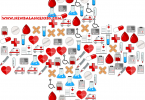
International Federation Of Red Cross And Red Crescent Societies
Cash And Social Protection Consultant at International Federation Of Red Cross And Red Crescent Societies
Background
The International Federation of Red Cross and Red Crescent Societies (IFRC) is the world’s largest humanitarian organization, with 190 member National Societies. As part of the International Red Cross and Red Crescent Movement, our work is guided by seven fundamental principles; humanity, impartiality, neutrality, independence, voluntary service, unity and universality.
Organizational Context
Climate shocks contribute significantly to the humanitarian burden and lead to poverty and food insecurity in addition to health and longer-term recovery problems. By 2030, climate change is expected to force tens of millions of people into extreme poverty (Hallegatte et al., 2016). Nigeria is regularly affected by multiple hazards, such as floods and droughts. In 2012, Nigeria experienced a double shock of severe drought and floods which caused nearly $17 billion in damages and losses in the 12 most-affected states. Due to climate change, the magnitude and frequency of droughts and floods have increased over the years and will continue to increase. Low-income households are the most vulnerable to weather-related natural disasters. Further, they can often be excluded by interventions that focus on the total amount of damages rather than the relative impact on low income vulnerable populations. Agriculture, which is heavily impacted by flooding and drought, serves as the main source of income for 80 percent of the rural poor population while indirectly having an impact on other sectors. In addition, the rapid rise of urban poverty increases potential flood risk. IFRC works in-country to support NRCS to strengthen their capacity in humanitarian preparedness and response. IFRC alongside with the Red Cross Red Crescent Climate Centre (RCCC) have been supporting the development of Forecast-based financing (FbF) to promote early action through meteorological triggers. The FbF approach is setting up meteorological triggers to ensure preparedness and enable pre-disaster action that serve to mitigate and reduce the harm disasters pose on the most vulnerable. They have also been supporting the NRCS in cash programing in country notable for the most recent 2018 floods operation. Both cash-based programming, and the FbF approach present great potential to improve early action and reduce impacts of shocks. Linking such approaches with social protection systems in country might present significant advantages to improve the capacity, speed and scale of the operations. In the context of preparation of response to future flooding and eventual droughts, the partners wish to explore how they could eventually collaborate on a shock based social protection approach.
Job Purpose
IFRC in partnership with UNICEF seek a feasibility study to:
- Assess the National Cash Transfer Programme, particularly at state level, to integrate shock-responsive elements into their programme design and implementation.
- Support UNICEF and IFRC to launch a pilot project to provide cash assistance to flood-affected communities using elements of existing social protection mechanisms. Specifically, develop the key programmatic elements of the pilot project (including possible geographic locations, targeting approach, cash disbursement mechanism to be used, monitoring mechanisms, budget, timeline, etc.)
- Identify concrete opportunities for how the pilot project can contribute to building an evidence base for shock-responsive social protection in Nigeria.
- Clarify the added value of UNICEF, IFRC and NRCS engagement/contributions to the pilot project.
Job Duties and Responsibilities
Scope of Work at International Federation Of Red Cross And Red Crescent Societies
These are the key tasks that will need to be completed by the consultant within this period.
- Review the National Cash Transfer Programme to assess the potential for using existing government mechanisms (in part or in full) for the delivery of cash-based assistance before, during or after an emergency/shock.
- Review the country’s early action landscape, and advise on the potential for forecast-based action and cash based interventions to be piloted and scaled up in this context at a later stage of project implementation. Propose suggested next steps, including in-depth feasibility studies, etc.
- Make recommendations for the role of IFRC and UNICEF can play in promoting shock-responsive social protection, as well as coordination with other stakeholders and partners.
Expected Deliverables
- Concept note for promoting a shock-responsive social protection approach in Nigeria, which should outline the overall approach to piloting cash-based assistance in response to a climate shock within the framework of a social protection mechanism (most likely NCTP). The note should include the overall assessments made on the strength of existing social protection mechanisms (NCTP) and early action landscape, and advise on appropriate roles that IFRC and UNICEF can play in promoting shock-responsive social protection.
- A draft donor proposal on piloting cash transfers as part of a social protection programme in Nigeria (including proposed location and scale, project narrative, logical framework, budget, M&E plan)
Reporting
- Task force will be created of UNICEF, NRCS, IFRC and the RCCC to oversee the work, serving as the primary focal point for the consultant. Meetings will be held regularly between the task force and the consultant to guide work and ensure the completion of the steps outlined above.
- The consultant will be hired by IFRC.
Period and Place of Consultancy
All the work done under this consultancy will be completed within 30-35 days, following the effective date of the contract. The consultant will be expected to travel to Abuja, Nigeria for a minimum of two weeks.
Education
The consultant should have the following qualifications and expertise;
- Master degree or PhD in /International Development
Experience
- A minimum of 10 years professional experience work on social protection and food security
- Demonstrated experience in design/implementation of social protection systems
- Strong knowledge on forecast-based financing
Knowledge, skills and languages
- Fluent written and spoken English is preferred
Competencies and values
- Communication
- Collaboration and Teamwork
- Judgement and Decision Making
- National Society and Customer Relations
- Creativity and Innovation
- Building Trust
METHOD OF APPLICATION
All interested and qualified applicants should apply through the International Federation Of Red Cross And Red Crescent Societies career portal
To apply for this job please visit www.ifrc.org.






